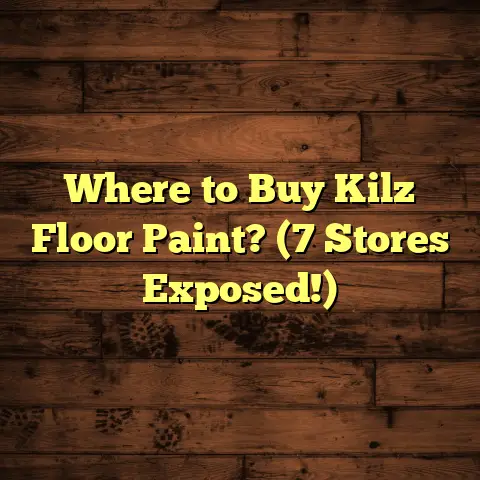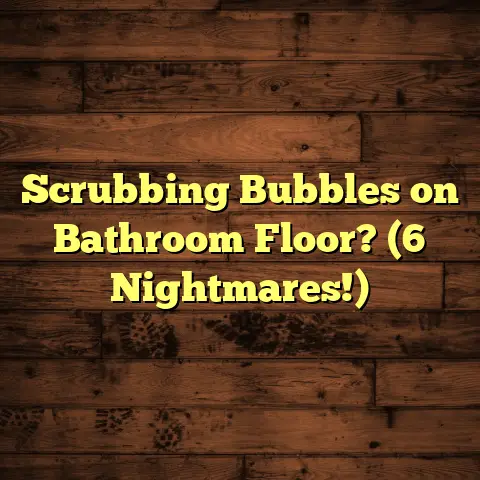Paint Options for Concrete? (4 Coatings Compared!)
Have you ever looked at a dull, gray concrete surface and thought, “Man, this could really use some life?”
I know I have!
As a flooring contractor, I’ve seen firsthand the transformative power of color.
A simple pop of color can breathe new life into even the most boring concrete.
And that’s where painting concrete comes in.
It’s a practical way to enhance aesthetics, boost durability, and improve functionality.
In this article, I’m going to walk you through four different paint coatings perfect for concrete.
We’ll dive into their unique features, benefits, and potential drawbacks, so you can make the best choice for your project.
Section 1: Understanding Concrete Surfaces
First things first, let’s talk concrete.
We see it everywhere: driveways, patios, floors, walls… it’s a staple of modern construction.
But did you know that not all concrete is created equal?
Understanding the type of concrete you’re working with is crucial for a successful paint job.
Common types include:
- Driveways: Typically exposed to the elements and heavy traffic.
- Patios: Often decorative and require weather resistance.
- Floors: Need to be durable and easy to clean, especially in garages or basements.
- Walls: Can be interior or exterior, each with different needs.
Concrete is a bit of a Jekyll and Hyde surface.
It’s incredibly strong and durable, but also porous and prone to cracking.
This means it can be both challenging and rewarding to paint.
So, what should you consider when choosing a paint for concrete?
- Texture: Is the surface smooth or rough?
- Porosity: How absorbent is the concrete?
- Exposure: Will it be exposed to sun, rain, or chemicals?
- Traffic: How much foot or vehicle traffic will it endure?
These factors will heavily influence the type of paint you choose.
Section 2: Overview of Paint Options
Alright, let’s get to the good stuff!
I’m going to compare four popular coatings for concrete:
- Epoxy Paint
- Acrylic Paint
- Concrete Stain
- Polyurethane Coating
Each of these has its own strengths and weaknesses, so let’s dive in and see what makes them tick.
Section 3: Epoxy Paint
Epoxy paint is a powerhouse when it comes to concrete coatings.
It’s formulated with two main components: a resin and a hardener.
When these are mixed, a chemical reaction creates a super durable, hard finish.
What are the advantages of epoxy paint?
- Durability: It can withstand heavy traffic and impacts.
- Chemical Resistance: Perfect for garages or workshops where spills are common.
- Easy to Clean: A simple wipe-down keeps it looking fresh.
I often recommend epoxy paint for garage floors, industrial settings, and high-traffic areas.
It’s tough stuff!
But what are the drawbacks?
- Complex Application: Mixing the resin and hardener requires precision.
- Curing Time: It can take several days for the epoxy to fully cure.
- Surface Prep: Concrete needs to be properly prepped before application.
I remember one time I was working on a garage floor.
The client wanted a coating that could handle oil spills and heavy tools.
We opted for epoxy paint, and the results were fantastic.
The floor looked great, and the client was thrilled with the added protection.
However, the application was a bit tricky.
We had to carefully measure the resin and hardener, and ensure the concrete was perfectly clean and dry.
But in the end, it was worth the effort.
Section 4: Acrylic Paint
Acrylic paint is a versatile and user-friendly option for concrete surfaces.
It’s composed of acrylic polymers, which create a flexible and durable film when dry.
What are the benefits of acrylic paint?
- Flexibility: It can expand and contract with the concrete, reducing the risk of cracking.
- UV Resistance: It holds its color well, even in direct sunlight.
- Wide Range of Colors: You can find acrylic paint in just about any color imaginable.
- Ease of Application: It’s easy to apply with a brush, roller, or sprayer.
I often recommend acrylic paint for patios, walkways, and other outdoor surfaces where aesthetics are important.
What are the limitations?
- Susceptibility to Wear and Tear: It may not hold up as well as epoxy in high-traffic areas.
- Less Chemical Resistance: It’s not as resistant to chemicals as epoxy or polyurethane.
I once used acrylic paint to transform a dull concrete patio into a vibrant outdoor living space.
The client wanted a bright, cheerful color that would complement their garden.
We chose a sunny yellow, and the results were stunning.
The patio looked brand new, and the client was over the moon.
Acrylic paint is a great choice when you want to add color and personality to your concrete surfaces without breaking the bank.
Section 5: Concrete Stain
Concrete stain is a different beast altogether.
Instead of coating the surface like paint, it penetrates the concrete, creating a permanent color change.
This results in a more natural, translucent look that highlights the concrete’s unique texture and patterns.
What are the advantages of concrete stain?
- Aesthetic Appeal: It enhances the natural look of concrete.
- Deep Penetration: The color won’t chip or peel.
- Long-Lasting Effects: It can last for years with proper sealing.
I often recommend concrete stain for interior floors, patios, and other surfaces where you want a natural, earthy look.
What are the downsides?
- Limited Color Palette: The color options are more limited than with paint.
- Need for Resealing: It needs to be resealed periodically to protect the color.
- Surface Preparation: Concrete needs to be thoroughly cleaned and etched before staining.
I had a client who wanted to transform their basement floor into a stylish, modern space.
They didn’t want a solid color, but they wanted something that would add warmth and character.
We opted for a concrete stain in a rich brown tone.
The stain penetrated the concrete, creating a beautiful, natural look.
The client was thrilled with the results.
It gave their basement a sophisticated, industrial vibe.
Concrete stain is a great way to add depth and character to your concrete surfaces.
Section 6: Polyurethane Coating
Polyurethane coating is a high-performance option that offers excellent durability and chemical resistance.
It’s a synthetic resin that forms a tough, flexible film when dry.
What are the benefits of polyurethane coating?
- High Durability: It can withstand heavy traffic and abrasion.
- Chemical Resistance: It’s resistant to a wide range of chemicals.
- Glossy Finish: It provides a smooth, shiny finish.
- Versatility: It can be used on a variety of concrete surfaces.
I often recommend polyurethane coating for industrial floors, laboratories, and other areas where durability and chemical resistance are critical.
What are the challenges?
- Application: It can be tricky to apply evenly.
- Professional Installation: In some cases, professional installation is recommended.
- Cost: It can be more expensive than other coatings.
I worked on a project where we needed to coat the floor of a chemical storage facility.
The floor needed to be resistant to spills and leaks from a variety of chemicals.
We opted for a polyurethane coating, and it performed flawlessly.
The floor was easy to clean, and it stood up to the harsh chemicals without any problems.
Polyurethane coating is a great choice when you need a high-performance coating that can withstand tough conditions.
Section 7: Comparative Analysis of the Four Coatings
Okay, let’s break it down.
Here’s a comparison table summarizing the key features, benefits, and drawbacks of each coating option:
| Feature | Epoxy Paint | Acrylic Paint | Concrete Stain | Polyurethane Coating |
|---|---|---|---|---|
| Durability | Excellent | Good | Good | Excellent |
| Chemical Resistance | Excellent | Fair | Fair | Excellent |
| UV Resistance | Good | Excellent | Good | Good |
| Aesthetics | Solid color, glossy | Wide range of colors, various finishes | Natural, translucent | Glossy, clear |
| Application | Complex | Easy | Moderate | Moderate to Complex |
| Cost | Moderate | Affordable | Moderate | Expensive |
| Best For | Garages, industrial floors | Patios, walkways | Interior floors, patios | Industrial floors, labs |
| Drawbacks | Complex application, long curing time | Susceptible to wear and tear | Limited color palette, needs resealing | Application difficulty, cost |
So, which coating is right for you?
- Epoxy Paint: If you need a super durable, chemical-resistant coating for a high-traffic area.
- Acrylic Paint: If you want a versatile, affordable coating with a wide range of colors for outdoor surfaces.
- Concrete Stain: If you want a natural, earthy look that enhances the concrete’s texture for interior floors or patios.
- Polyurethane Coating: If you need a high-performance coating that can withstand tough conditions and chemical exposure for industrial settings.
Cost Considerations and Longevity
Cost is always a factor, right?
Acrylic paint is generally the most affordable option, while polyurethane coating tends to be the most expensive.
Epoxy paint and concrete stain fall somewhere in the middle.
In terms of longevity, epoxy and polyurethane coatings typically last the longest, followed by concrete stain and acrylic paint.
However, proper surface preparation and maintenance are crucial for maximizing the lifespan of any coating.
Section 8: Conclusion
Choosing the right paint for your concrete surfaces can make all the difference.
Whether you’re looking to enhance aesthetics, improve durability, or increase functionality, there’s a coating option that’s perfect for your needs.
Remember to consider the specific characteristics of your concrete, your aesthetic preferences, and the demands of the environment when making your decision.
With the right paint choice, you can transform your concrete surfaces into vibrant, functional, and visually appealing spaces.
Call to Action
Ready to get started?
I suggest exploring local suppliers for your preferred paint options.
And if you’re not comfortable tackling the project yourself, consider consulting with a professional contractor for the best results.
Do you have any experiences with concrete painting that you’d like to share?
Or maybe you have some questions about which coating is right for your project?
Let me know in the comments below!
I’m always happy to help.





